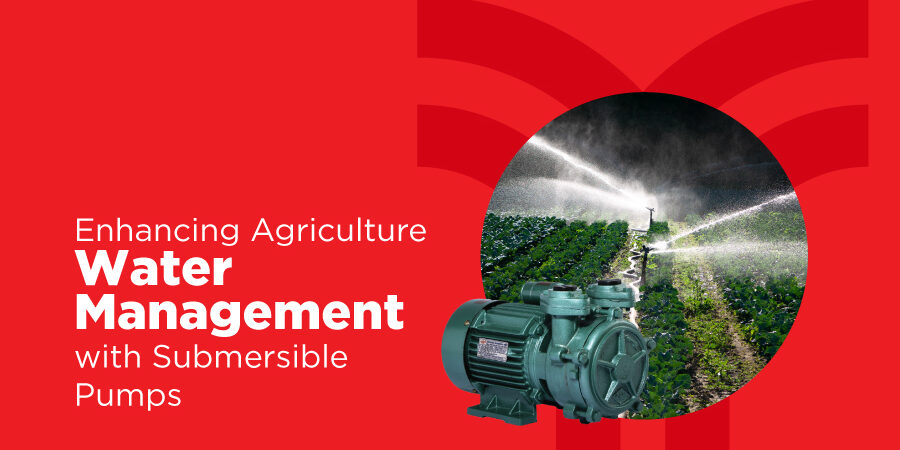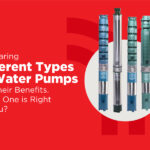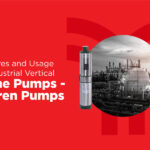Enhancing Water Management in Agriculture Using Submersible Pumps
Water management is an important part of agriculture, affecting crop productivity, soil health, and sustainability. Effective irrigation is now more important than ever due to the increasing demands of climate change, erratic weather patterns, and increased water scarcity. One important technological advancement for improving agricultural water management is the submersible pump.
Submersible pumps are designed to operate underwater, providing efficient water delivery for various agricultural applications. To get high-quality pumps, many turn to submersible pump manufacturers in Coimbatore, a city known for its robust manufacturing industry and expertise in pump technology. This blog examines submersible pumps’ function in agriculture as well as their uses and how to choose the right one.
The Need for Efficient Water Management in Agriculture
Roughly 70% of all water present worldwide is attributed to agriculture, making it a significant consumer of freshwater resources. Water scarcity becomes an urgent problem when population growth and weather patterns are altered by climate change. Effective water management in agriculture is important for ensuring food security and sustainability.
The main challenges include,
- Water Scarcity: Reduced water supplies and conflicting needs from other industries create water scarcity.
- Ineffective Irrigation: Water loss through evaporation and ineffective distribution is a common consequence of using traditional irrigation techniques.
- Depletion of Groundwater: An over-dependence on groundwater resources may result in environmental harm and depletion.
- Climate Change: Modifications in weather patterns can cause disruptions to agricultural schedules and water supply.
Role of Submersible Pumps in Agriculture
Numerous issues related to managing water in agriculture are solved by submersible pumps. They are perfect for a variety of applications because of their efficiency and adaptability, including:
- Irrigation Systems : To guarantee reliable and effective water delivery to crops, submersible pumps can be utilized in drip irrigation, sprinkler systems, and other irrigation configurations.
- Groundwater Extraction: Farmers can obtain dependable water supplies during dry seasons or droughts by using these extremely efficient methods of reaching deep groundwater sources.
- Reservoir Management: Water levels in dams can be controlled with submersible pumps to provide ideal distribution and storage.
- Drainage Systems: Submersible pumps help control water levels and minimize crop damage in regions that are vulnerable to flooding or heavy rains.
Advantages of Submersible Pumps
Several benefits of submersible pumps help to enhance agricultural water management including:
Submersible pumps don’t need extra energy to create pressure because they run underwater. Higher efficiency, less energy use, and lower operating costs are the results of this.
2. Reduced Noise
These submersible pumps produce less noise pollution on farms and improve the working atmosphere because of their quiet operation.
3. Reduced Cavitation Risk
Pumps can sustain damage via cavitation, a phenomenon in which vapor bubbles develop and burst. Because submersible pumps are always submerged in fluid, they are less likely to have cavitation.
4. Adaptability
Because submersible pumps are available in a range of sizes and capacities, both large and small-scale agricultural businesses can benefit from using them. In addition to other uses, they can be employed in drainage, irrigation, and groundwater extraction.
5. Effectiveness of Space
Submersible pumps don’t need substantial surface installations like surface pumps do. They are therefore perfect for farms with restricted space.
6. Durability
Submersible pumps are built to endure extreme conditions and corrosive environments, resulting in a longer lifespan and lower maintenance requirements.
Key Considerations for Using Submersible Pumps in Agriculture
Even though submersible pumps have many advantages, using them effectively in agriculture needs careful planning and consideration of a number of considerations, including:
Selecting the appropriate submersible pump is essential. Considerable elements include:
Flow Rate and Pressure: Based on the size of your farm and your irrigation requirements, calculate the necessary flow rate and pressure.
Depth: Because submersible pumps come in a variety of lengths, take into account the depth of your water supply.
Material and Durability: Verify that the pump is constructed from resilient materials that are resistant to corrosive conditions.
Submersible pump manufacturers like Torren Pumps can offer expert guidance in this area, ensuring you select the right pump for your specific application.
2. Installation
To guarantee the longevity and effectiveness of the pump, proper installation is essential. Important things to think about are:
Well Casing: Verify that the well casing is in good shape and fits the pump.
Electrical Connections: To avoid risks, make sure that all electrical connections are safe and secure.
Placement: To prevent bringing silt or other material into the system, set the pump at the proper depth.
3. Maintenance
The longevity and optimum functioning of the pump are guaranteed by routine maintenance. Important upkeep duties include:
Regular Inspections: Look for indications of corrosion, damage, or wear and tear.
Cleaning: To avoid blockage and sediment buildup, clean the pump and its surroundings.
Electrical Checks: Verify the safety and security of all electrical connections.
4. Security
Because submersible pumps run on electricity, there may be safety concerns. Ascertain appropriate safety precautions, such as:
The purpose of ground fault circuit interrupters, or GFCIs, is to stop electrical risks.
Correct Wiring: To reduce dangers, make sure wiring is completed by a trained expert.
Installing emergency shutdown switches can increase safety.
Choosing the best submersible pump wholesalers who are reputable and knowledgeable is key to overcoming these considerations and achieving the full benefits of using submersible pumps in agriculture.
In a world facing increasing water challenges, submersible pumps offer a practical solution to help farmers meet the demands of a changing climate and growing populations. By embracing this technology, agriculture can move towards a more efficient, sustainable, and resilient future.


